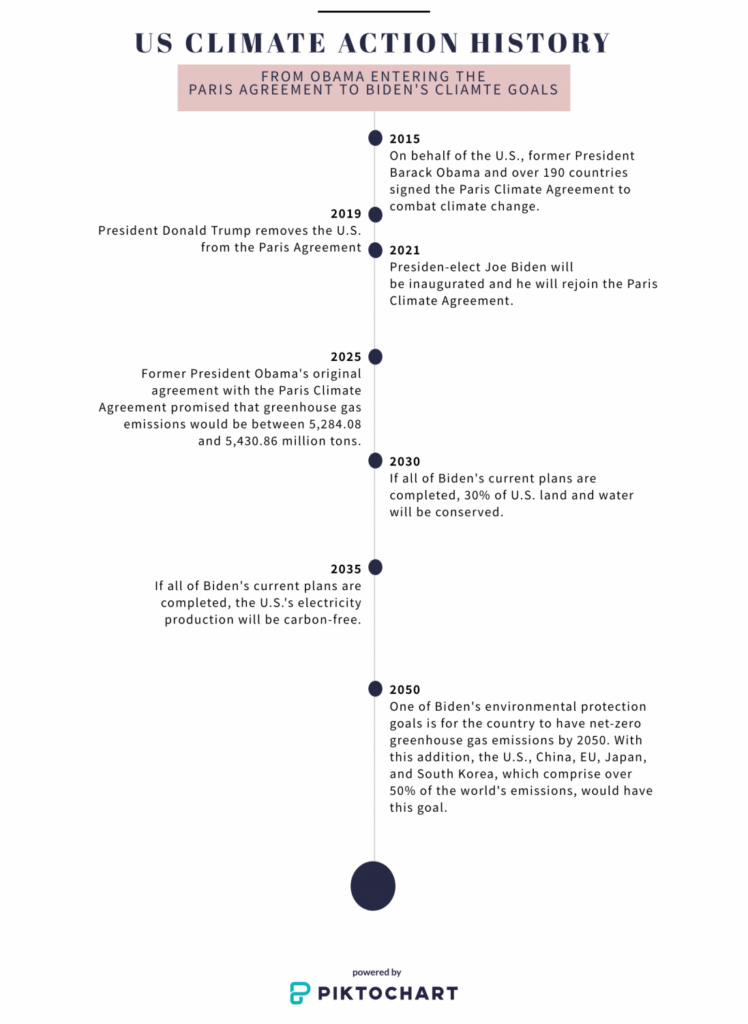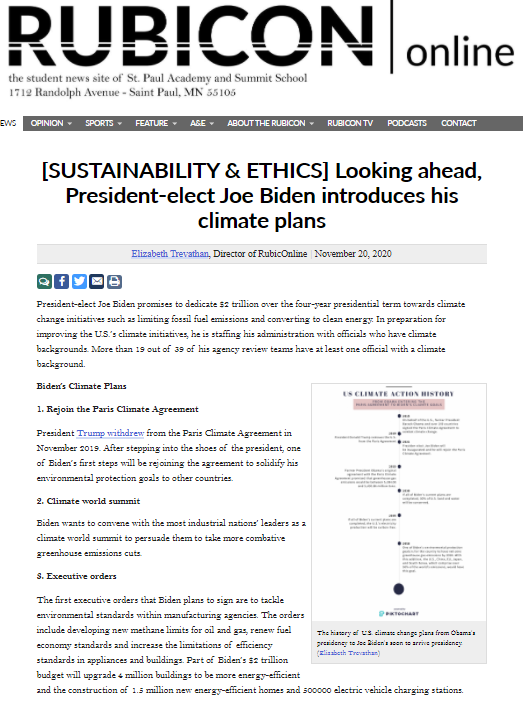November 20, 2020 – RubicOnline
President-elect Joe Biden promises to dedicate $2 trillion over the four-year presidential term towards climate change initiatives such as limiting fossil fuel emissions and converting to clean energy. In preparation for improving the U.S.’s climate initiatives, he is staffing his administration with officials who have climate backgrounds. More than 19 out of 39 of his agency review teams have at least one official with a climate background.
Biden’s Climate Plans
1. Rejoin the Paris Climate Agreement
President Trump withdrew from the Paris Climate Agreement in November 2019. After stepping into the shoes of the president, one of Biden’s first steps will be rejoining the agreement to solidify his environmental protection goals to other countries.
2. Climate world summit
Biden wants to convene with the most industrial nations’ leaders as a climate world summit to persuade them to take more combative greenhouse emissions cuts.

3. Executive orders
The first executive orders that Biden plans to sign are to tackle environmental standards within manufacturing agencies. The orders include developing new methane limits for oil and gas, renew fuel economy standards and increase the limitations of efficiency standards in appliances and buildings. Part of Biden’s $2 trillion budget will upgrade 4 million buildings to be more energy-efficient and the construction of 1.5 million new energy-efficient homes and 500000 electric vehicle charging stations.
4. Environment Justice
Biden’s climate plan includes monitoring pollution and the effects of global warming on low-income and communities of color. Historically, toxic facilities have been placed in locations where most of the population consists of low-income persons and people of color. In the past, the U.S. has not provided environmental and health protection to these communities.
5. Reverse what President Trump did
Trump made numerous cuts to environmental initiatives during his four years in office, including diminishing the preservation of Bears Ears National Monument and Grand Staircase-Escalante National Monument. Biden plans to sign an executive order that will conserve 30% of U.S. land and water by 2030.
6. Restaffing & rebuilding climate agencies
Within Biden’s transition, he will work to restaff climate agencies that Trump dismantled. For example, the United States Environmental Protection Agency lost 700 scientists under Trump’s administration and has not been able to fill most of those positions in the past two years.
7. Climate 21 Project
The Climate 21 Project provides recommendations to Biden’s administration to tackle climate change agencies within the White House. Their suggestions include upgrading eleven government offices, agencies, and departments to have more aggressive climate action and a new policy council to supervise climate work in all federal agencies.
8. Net-zero by 2050
Biden proposes to change the U.S.’s electricity production to be carbon-free by 2035. He also wants the country to have net-zero emissions by 2050. Becoming net-zero not only requires the U.S. to diminish carbon emissions significantly, but it also requires the U.S. to remove as much carbon emissions from the atmosphere as it produces by completing actions such as planting trees.
The original goal of the Paris Climate Agreement was to maintain global temperatures below a 2℃ increase. More recently, UN scientists have set a new target to limit the global temperature rise to 1.5℃. With Biden’s climate goals for the U.S., countries like China, the U.S., EU, Japan, and South Korea, which make up over 50% of global greenhouse gas emissions, would have a net-zero commitment to live up to by 2050.
The primary aspect of the government that stands in Biden’s way to succeed in his environmental plans is that republicans control the Senate. If the Senate refuses to pass his legislation, Biden is prepared to issue executive orders, which would ultimately be decided by the predominantly Republican Supreme Court. While it will be difficult for Biden’s administration to pass laws, the environment is central in his administration, and the country will make strides to a cleaner future.
